‘Force of nature’ Ada Deer dies at 88
The Menominee woman fought against federal termination policy and led her tribe’s restoration effort
Kevin Abourezk
ICT

Ada Deer, Menominee Indian Tribe of Wisconsin. Deer died Tuesday, Aug. 15, 2023. She was 88. (Courtesy of Menominee Indian Tribe of Wisconsin)
Ada Deer, a “force of nature” and a legendary figure whose life and accomplishments are woven into the social and political fabric of Indian Country, died Tuesday night.
Deer, 88, was the first Native American woman to run for statewide office and only the second to run for Congress. She was the first woman to serve as Assistant Secretary for Indian Affairs at the Interior Department. She was also the first woman chair of her tribe, the Menominee Indian Tribe of Wisconsin.
On Wednesday, the tribe issued a statement.
“It is with great sadness that we announce the passing of Ada Deer, a prominent leader of the Menominee Indian Tribe of Wisconsin,” the tribe wrote. “Ada was a true inspiration to many and her legacy will continue to live on through her contributions to the Menominee community and her tireless work in advocating for Native American rights.”
Deer was an instrumental figure in the 1973 restoration of her tribe following its termination 15 years earlier. She later served as the first chair of the Menominee Restoration Committee.
“Ada’s contributions to the Menominee community and her dedication to improving the lives of Native Americans will never be forgotten,” the Menominee Tribe said Wednesday. “As we mourn her loss, let us also celebrate her remarkable life and the profound impact she had on all of us.”
During termination, the Menominee Tribe became a county instead of a reservation.
Deer once told ICT: “This is the story of Indian land ownership throughout the history of this country. It was lost after certain pieces of legislation have passed to allot Indian land to private Indian owners who have little real estate know-how.”
In order to fight for restoration of the tribal government, Deer dropped out of law school.
“I moved to Washington, D.C., in 1972 to lobby … I talked to everyone I could,” Deer said. “I held meetings with reporters. I held meetings with legislative aides. I went around to receptions. I smiled. I shook hands. I prepared bumper stickers and fact sheets and made it look like there were thousands of Indians, screaming about termination. That’s part of what it takes to get a bill through the Congress.”
Gwen Carr, a longtime friend of Deer’s and executive director of the Carlisle Indian School Project, said the Menominee restoration was a milestone in the efforts of tribes to regain federal recognition following the Termination Era of 1950s and 1960s.
“For a Native person to get their tribe out of termination is a prodigious effort,” said Carr, a citizen of the Cayuga Nation. “Nobody had ever done that before.”
Deer had a way of convincing people to do what she wanted, not by arguing with them, but simply by talking to them until they agreed with her, Carr said.
“She was a force of nature who was as gentle as a breeze,” she said.
Born in Keshena, Wisconsin, Deer spent her childhood in a log cabin on the Menominee reservation without running water or electricity, attended Shawano High School and studied at the University of Wisconsin-Madison and later at Columbia University.

In 1978 and 1982, Deer ran for Wisconsin secretary of state, and then for Congress in 1992. Many remember her campaign slogan “Run Like a Deer.”
She was appointed by President Bill Clinton in 1993 as the Assistant Secretary for Indian Affairs at the Interior Department, a position that included overseeing the Bureau of Indian Affairs. In that capacity, she signed off on federal recognition of hundreds of Alaskan tribes that, for decades, had been fighting for sovereignty. Many saw the Alaska Native Claims Settlement Act as a termination bill. So Deer’s act fits a restoration of tribal government in that state.
She led the American Indian and Indigenous Studies Program at the University Wisconsin-Madison, chaired the board of the Native American Rights Fund and co-founded the Indian Community School in Milwaukee.
Carr said more than once she accompanied Deer to events where people would line up to meet her friend, but that recognition never inflated Deer’s ego. Instead, she had a profound gentleness and innocence about her, though she was nobody’s fool, Carr said.
She said Deer never married or had children, instead devoting her life to advancing the rights of Native people.
“A big page in Indian Country has turned,” she said.

On Aug. 7, Deer celebrated her 88th birthday, leaving hospice care to attend a celebration that drew Wisconsin state and Menominee tribal leaders, including Wisconsin Gov. Tony Evers, U.S. Sen. Tammy Baldwin and Menominee Chairwoman Gena Kakkak. All paid tribute to Deer’s legacy and influence in their lives.
The same day, Gov. Evers proclaimed Aug. 7, 2023, to be “Ada Deer Day.”
“It is my honor to proclaim today as ‘Ada Deer Day’ throughout Wisconsin to recognize her groundbreaking work as a champion for Tribal rights and Indigenous communities, an advocate for social justice, and a foundational changemaker in our state,” Evers wrote on social media.
Deer also spoke at the celebration.
Writing on social media recently, Ben Wikler, Deer’s godson and chair of the Wisconsin Democratic Party, summarized her final speech.
“She urged everyone, all of us — you reading this right now — to dedicate ourselves to advancing justice in this world.”
External
Talking Circle
At Buffalo's Fire we value constructive dialogue that builds an informed Indian Country. To keep this space healthy, moderators will remove:
- Personal attacks or harassment
- Propaganda, spam, or misinformation
- Rants and off-topic proclamations
Let’s keep the fire burning with respect.
The tree features names of missing Indigenous people
The billboard project is expanding to Oregon
Identification not yet made
UTTC International Powwow attendees share their rules for a fun and considerate event
Radio collaboration highlights importance of cooperation in a season of funding cuts for local media






